GBH Read online
Page 13
“He couldn’t be totally sure.”
“Quite. So when Glenda gets the unscheduled phone call enquiry into his whereabouts, she phones him, as he would have instructed her to.”
“Which means she knew what he was up to.”
“Not necessarily. Two alternatives here. If she was in it, she phones him, he tells her to join him quicker than arranged. They hadn’t wanted to go together, to attract that kind of attention.”
“Or?”
“Or she wasn’t in the picture at all.”
“So why does she fly off to Amsterdam?”
“Leaving to one side the fact that a lot of people would fly off to Amsterdam or elsewhere after an enquiry by Mickey on your behalf,” Jean said, “leaving that to one side, I have no sodding idea.”
“There’s what Mickey said,” I said.
“Oh yes. Supposing Ray wants to top her: because he’s fed up with her and she might tell tales or whatever. So, not wanting to agitate the locals, he waits until he’s on foreign turf. So he can get rid of her nice and quiet, without drawing undue attention to himself.”
I get up and go over to the drinks.
“You do see what I mean?” Jean said.
“Yes,” I said. “I do see what you mean.”
“So somebody else had Glenda topped.”
I dropped some ice in my drink.
“If so, the immediate question not being who or why,” I said. “Because there only seems one possibility in that respect. The question is how did they know what was going down?”
THE SEA
I DRIVE INTO MABLETHORPE.
The evening paper comes in about a quarter to six.
So I park my car at the foot of the ramp and cross the promenade and walk down the street towards the paper shop. The lights from the arcade flop limply onto the pavement. On impulse, for no reason whatsoever, I drift over to the arcade and into it and get some change and go over to my pin-table and try to beat my previous best. But I get nowhere near. I seem to have lost my touch. All I keep getting is Tilt.
So in the end I give up and go out into the street again.
Across the street, a bit farther down, the double frontage of the newsagent’s is illuminated as if for all the world they’re still using gas mantles inside.
I cross the street and open the door and walk over to the counter and take a copy of the evening paper from off the pile.
“I don’t know about you,” the old girl says as she takes my money, “but I think it’s gone ever so cold this afternoon.”
“I hadn’t noticed,” I say to her. “But now you come to mention it, I suppose it has a bit.”
“Wicked,” she says. “I thought we’d had the last of the winter. We don’t want another season like we had last year.”
“Cold, was it?”
“Cold and miserable. It’s all right for the arcades and the bingo and the pubs, but we’ve still got stuff out the back from last season.”
“Well,” I say, “let’s hope for a bit of sunshine, eh?”
“Yes,” she says. “Let’s hope.”
I tuck my newspaper under my arm and go out of the shop.
In the South I get the hero’s return from Jackie.
“Well,” he says, “hello stranger. Beginning to think you’d gone into hibernation. Mind you, couldn’t blame you, what with the weather.”
I tell him to take for himself, which he does with a fair amount of swiftness; he must have been dry for the whole week. While he’s getting his and mine, I notice he’s got a copy of the evening paper spread out on the counter, front page upwards. I look at the upside-down picture of the smash-up.
Jackie places the drinks on the counter and clocks me clocking the photograph.
“Nasty, isn’t it?” he says. “Still, there’s a bright side to everything; somebody’ll be getting a visit from the insurance people.”
“Yes,” I say to him. “Everything’s got two sides to it.”
THE SMOKE
“APART FROM ANYTHING ELSE,” I said, “there is too much of Mickey committed to film and tape for him even to begin having nightmares about that kind of a deal; my thirty years would be his thirty years.”
James studied his brandy.
“All we can do is examine the facts.”
“There aren’t any.”
“Well,” said James, “to begin with—”
“To begin with, all else apart, he might be able to do a deal with Farlow and the Sheps. But this is Parsons’s case. And nobody, not even Jack Jones, can do a deal with Parsons.”
“George—” James began, but I cut him off.
“I know what you’re going to say; Jean apart, Mickey was the only one who knew we were having the investigation, the only one who knew we were on to Ray. He phoned her up, we went straight over. But he went to get the car out; he’d got time to make another, quicker, phone call.”
“That is one of the facts, yes.”
“So that the Sheps can take her over to Amsterdam and point her, us thinking Ray did her in, so that Parsons can blaze a trail to our front door. Behind which door is not only Jean and myself, but also Mickey. He gives us all to Parsons, including himself, just for the pleasure of having the next thirty years watching Farlow and the Sheps carve up our operation, of which, I might add, he’s not exactly a minor shareholder.”
James drank some of his brandy, savoured it.
“That is all so,” he said. “But you are in the middle of an attempt to incriminate you. The biggest piece of evidence at the moment being Glenda, and only you and Mickey knew you were going to visit her.”
“Excepting,” I said, “excepting Ray.”
THE SEA
THE NAME OF THE driver of the transit van is Malcolm Tunbridge, twenty-eight, of Marine View, Mablethorpe. Superficial injuries, released from hospital.
The name of the driver of the Escort was Ernest Emerson, garage proprietor, of High Street, Tealby. A widower.
The crossword-puzzle man’s name was Colin Hewitt, a sales representative, of Western Avenue, Grimsby. A wife survived him.
According to the driver of the transit van, who had been proceeding on his way from Mablethorpe to Grimsby, the accident had been down to the driver of the Cortina. He’d begun to overtake with plenty of time to make it past the transit van before the bend, but the Cortina had seemed to lose power as it drew level with the transit van and then the Escort appeared coming round the bend from the opposite direction, and then there’d been nothing anybody could do. Just before the collision the Cortina had bumped the van and the van had gone on to the verge and finally into the ditch.
The girl, the passenger in the Cortina, had yet to be identified.
Lucky for Malcolm Tunbridge, twenty-eight, of Marine View, Mablethorpe.
I look at the photograph again. In monochrome, the smash seemed to have a greater reality than when I’d actually seen it, the way that black-and-white movies used to appear more realistic than those made in Technicolor. The blackness of the burnt-out metal looks much starker than it had in fact, made even more like crumbled charcoal by the rough grain of the photographic block. The number plate is diffused by the crudeness of the reproduction, but not enough to blur entirely the numbers and the letters; they’re still the same ones.
I fold the newspaper, photograph inwards, and drain my drink and get up and go over to the bar. Jackie refills us both and I’m just about to go back to my seat when Eddie comes in and makes it to the bar in about five seconds flat, the worries of his showbusiness world appearing to distract him even more than usual, but he’s not distracted enough to prevent him giving me the kind of welcome return I got from Jackie. I pay for his pint and, the formalities over, Jackie says to Eddie, “You’re in a mucksweat, aren’t you?”
“Too bloody right,” Eddie says. “We’ve got a gig at North Somercoates tonight and no bloody transport up to now.”
He nods at the newspaper that’s still lying on the bar.
“Thanks to that,” he says. “Jerry only lends it out for the afternoon, the silly bastard, and now look what happens.”
“It’s not written off, is it?” Jackie says.
“Oh, no, it’s not written off,” Eddie says. “It’ll only need a couple of hundred quid to put it right, that’s all. Which of course we haven’t got right at the moment.”
“So what are you going to do?” Jackie says.
“I’ve been running round trying to organise one,” Eddie says. “I’ve even tried persuading Cyril to let us have one of the Electricity Board ones.”
“Have you tried Grafton at Central Garage?”
“Yeah, I’ve tried him, the mean old sod. He wants fifty quid deposit apart from the hire.”
“Miserable old bugger.”
“Yeah,” he says. “As if what happened to the other van was something to do with me.”
THE SMOKE
JEAN SAID, “WE’VE ALREADY been through that one.”
“I know we have,” I said. “And I’ve been thinking. Supposing when she calls Ray, what better way can he think of to stop us proceeding too immediately in his direction than to do what we’re assuming the Sheps have done: leave Glenda in a showroom window, to slow us down a bit while the Law attempts to take its course.”
“It’s a thought,” said James. “But not one I would consider worth pursuing.”
“All right,” I said. “Let’s hear your contribution.”
“Well,” he said, adding some more brandy to his glass, “I would imagine that the Shepherdsons and Farlow are content to await developments following their initial contribution and leave Parsons to pick up anything else they’ve left around to be collected for your file.”
“Which could be just about anything.”
“Yes,” James said, “but I wouldn’t worry unduly. Even if it comes to you going into court, there’d be no case for you to answer. It would only be circumstantial, whatever was planted. In fact I’d quite enjoy a session with Parsons in the box.”
“Would you?” I said.
James smiled.
“I expect he’s already over there,” I said.
“It would help to know what the items were the Dutch police removed from Glenda’s room.”
“I talked to Pedersen,” I said. “He’s already doing what he can. He got on to his people in the department before Sven had even developed his snaps.”
“Well, that’s something,” James said.
There was a silence.
“What does worry me,” Jean said, “is Ray. If Glenda was meeting him in Amsterdam, why didn’t they do for him as well?”
“Ray would have stood back for a while,” James said. “To make sure Glenda hadn’t led anyone to him.”
“Or it supports my argument,” I said. “That Ray did for her himself.”
There was another silence. This time nobody broke it. We all sat there thinking our thoughts.
Then the phone rang.
THE SEA
WHILE JACKIE’S AWAY SERVING someone else I say to Eddie, “You got time for a quick word?”
“What?” Eddie says.
“A moment,” I say. “For a quick word.”
“Yeah,” Eddie says, “sure.”
“Let’s go and sit down.”
“Sure,” Eddie says. “Yeah.”
We go and sit down on the leatherette seating.
“That was bad luck about the transit van,” I say to him.
“Yeah,” he says, “but what can you do?”
“The driver,” I say. “Is he a mate of yours?”
“He’s no mate of mine,” Eddie says. “I’d never have lent the silly bugger it in a million years. I could murder him.”
“Unreliable, is he?”
“Between me and you,” Eddie says, “I would say it’s lucky for him the others didn’t come out of it alive.”
“Why do you say that?”
“I wouldn’t be surprised if it was down to him. He drives like a madman. I think I’ll send him a headstone for Christmas. Should come in more useful than a pair of socks.”
I take a sip of my drink.
“Incidentally,” I ask him, “had any joy with Lesley? I mean, about getting her on a permanent basis?”
“No,” he says, “I’m being facked about in that respect as well. She can’t make her fucking mind up what she wants. Which is just about anything with her talent. I suppose I’m lucky she’s even thinking about doing a spell with us.”
“When did you last talk to her about it?”
“I dunno. I haven’t seen her all week. In fact, now you come to mention it, I haven’t seen her since the amateur night.”
“She’s not been around?”
Eddie looks even gloomier.
“No,” he says. “I expect she’s like the rest of the Seasonals; as reliable as a two-bob watch. She’s probably fucked off to Skeggie or Yarmouth or somewhere to see what’s going on. If she’s done that I got no chance, have I?”
“I suppose not,” I say to him.
“No,” he says. He takes a sip of his pint. “No chance.”
We sit there in silence for a minute or two. Then I say, “So what are you going to do about tonight?”
“Christ knows,” he says. “And it’s not just tonight; if we can’t get the other van on the road, we’re going to lose a lot of bookings; there’s plenty of second-rate groups waiting to jump in.”
“How much do you need?”
“I beg your pardon?”
“Well,” I say to him, “the fellow at the garage wants fifty quid, and you say the work on the van’ll be about two hundred.”
“About that, yeah.”
“How much is it to hire the other van? Without the deposit.”
“Ten quid a night.”
I take ten tens from my wallet and fold them neatly and tuck them under the beer mat beneath Eddie’s pint glass. Eddie looks at the money and what I’ve done with it as if he’s never seen fingers folding money in his life before.
“What’s that?” he says.
“That should cover the van hire till next weekend. By then you’ll probably have got your own fixed up.”
Eddie looks at the money.
“I don’t know what to say,” he says.
“That’s all right,” I say to him. “When you get a price on the van, let me know what it comes to.”
“But I can’t—”
“Don’t worry,” I say to him. “I don’t want it back all at once. Let me have it whenever you can.”
Eddie looks at the money again.
“I’ll pay you back out of each booking,” he says.
“I’ve told you,” I tell him, “when you can.”
“I don’t know what to say,” he says again.
“Forget it. You’d better pick it up and get round to Grafton’s before he hires the van out to somebody else.”
Eddie takes the money and puts it in his inside pocket and drinks his drink and stands up.
“Each booking,” he says. “I’ll pay you back out of each booking.”
He clears off, not quite bowing from the waist down. I get up and go back to the bar and get myself another drink. Jackie has, of course, seen the passage of the money but he can’t think of any way of finding out what it’s all about without asking me point blank, and that he doesn’t do. And if he had asked, I don’t know what my answer would be. Of course, I could tell him what. But I doubt why. Perhaps I felt somehow responsible; the accident wouldn’t have happened if the crossword man hadn’t changed the venue, due to my indirect enquiries. Eddie was not only out of a van, but out of a star attraction. Perhaps it’s just because I don’t want anything else on my conscience at this present time.
“Anything on at the Dunes tonight?” I asked Jackie.
“Yeah, there’s some wrestling on. Starts at eight.”
“How could I ever miss that?” I say.
“Yeah,” says Jackie. “All good clean fun.”
I PUT THE PHONE down.
“That was Pedersen,” I said.
“So we gathered,” Jean said.
“What did he have to say?”
“The items removed from the hotel room,” I said. “They’ve also been removed from the local nick.”
“That’s good news,” James said. “What were they?”
“Mainly identification belonging to Ray. Bankers’ cards, deposit numbers, etcetera. But the main thing being a notebook including my name and various connected addresses.”
“Christ,” Jean said.
“There’s no need to worry. They were only at the nick half an hour before they were transferred out. Everybody knows what’s in the book, naturally, but nobody was able to make a copy before it got mislaid, along with Ray and Glenda’s other personal effects.”
“Well,” James said. “We can drink to that, at least.”
I watched Jean as she thought things out in the light of the phone call.
“Ray’s things, and the notebook,” she said.
“Right,” I said. “My theory isn’t all that stupid, is it?”
“Yes,” she said, “because if you were right, and he’d done Glenda that way to calm us down, he wouldn’t have chanced implicating himself. That part would have been very clean.”
“The items being planted as additional material to link it with us,” James said.
“But to do that, to get those items from Ray, the Sheps would have to know what was going on, and in good time,” I said.
“Quite,” said James. “Which makes my own theory not quite so stupid, does it?”
I poured myself another drink.
“It’s no good putting your head in the sand,” Jean said. “It’s got to be considered.”
THE SEA
I STAND IN THE lobby at the Dunes, listening to the ringing-out signal until at the other end the receiver is lifted and James says, “James Morville speaking.”
I tell him that it’s me.
“Christ, George,” he says, “you don’t expect me to have the number this soon, do you? I mean, it is Friday night.”

 All the Way Home and All the Night Through
All the Way Home and All the Night Through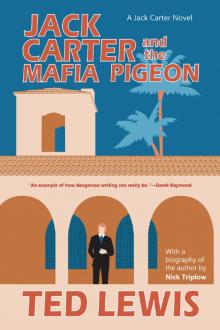 Jack Carter and the Mafia Pigeon
Jack Carter and the Mafia Pigeon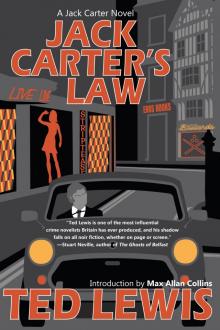 Jack Carter's Law
Jack Carter's Law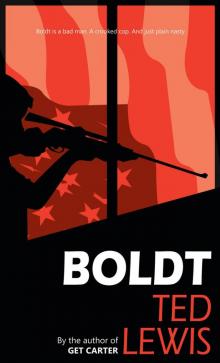 Boldt
Boldt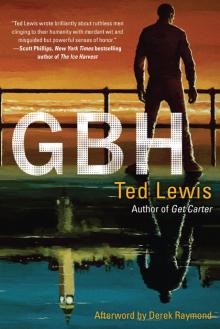 GBH
GBH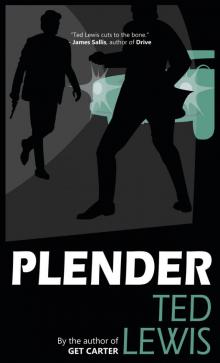 Plender
Plender The Rabbit
The Rabbit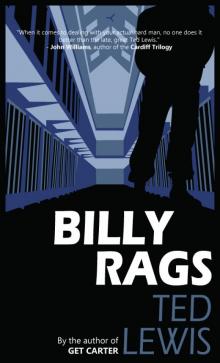 Billy Rags
Billy Rags